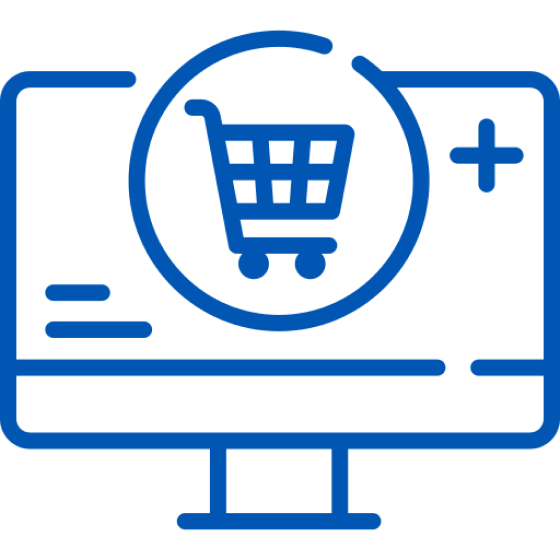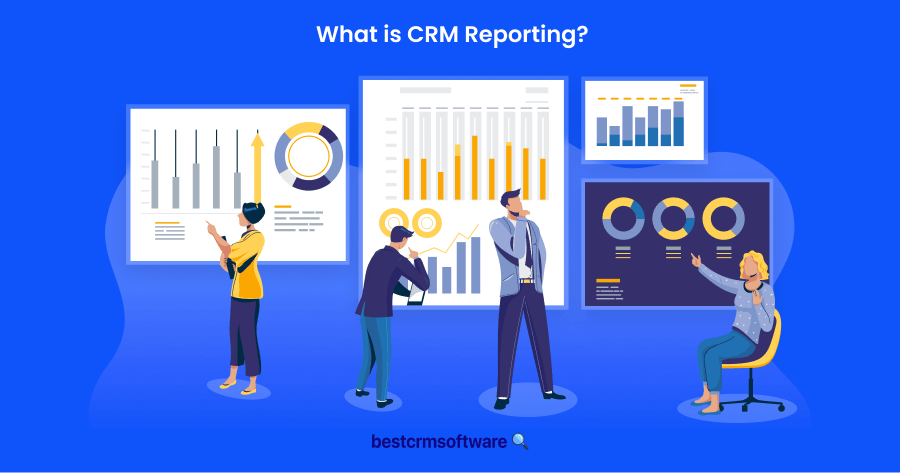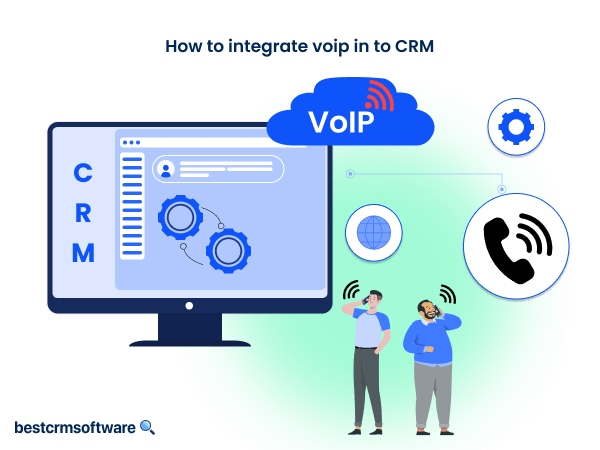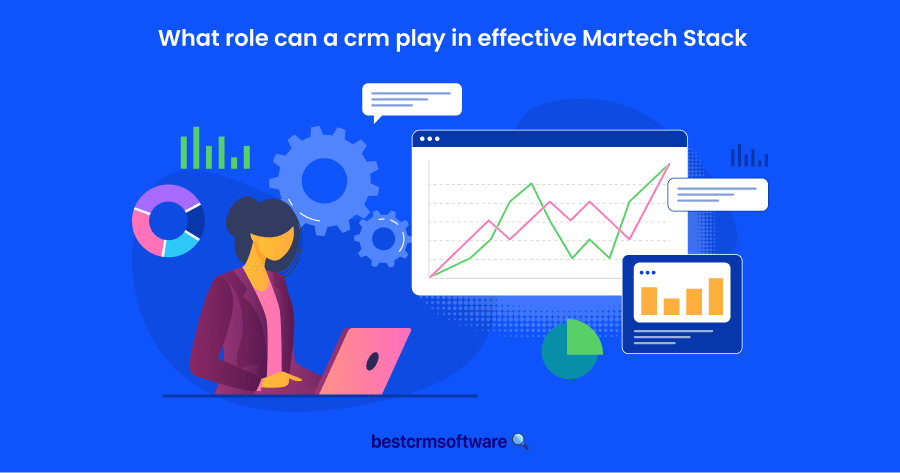
Best CRM Software for Marketing Automation
The top CRM options for marketing automation in 2024 offer robust features to streamline customer connections and business processes. Here are my best picks based on current trends and user input:
- HubSpot CRM– Best for small to medium marketing automation businesses
- SharpSpring- Best for revenue growth
- ActiveCampaign– Best for email marketing
- Mailchimp- Best for converting emails and SMS
- Keap– Best for managing invoices
- Zoho CRM– Best for customer service
- Pipedrive– Best Overall
- monday.com- Best for streamlining
- Salesforce Marketing Cloud- Best for comprehensive suite of tools
- Drift- Best for customer service
Each tool offers unique benefits like detailed analytics, user-friendly interfaces, and innovative communication tools, empowering businesses to enhance marketing strategies and engagement efforts.
Why You Need CRM with Marketing Automation
In 2024, CRM integration with marketing automation tools is changing how businesses connect with customers, thanks to AI progress. Personalizing customer interactions is crucial, but it’s now made possible by AI-driven analytics and seamless channel integration.
With AI, CRM tools predict customer needs, previously like fortune-telling. AI analyzes customer data, shaping personalized marketing strategies that resonate. Targeted campaigns improve satisfaction and engagement thanks to AI-driven insights.
Moreover, AI enhances CRM platforms, delivering tailored content and offers matching user interests. For instance, sentiment analysis by AI refines responses, improving customer service.
These technologies are embedded into CRM systems, boosting decision-making and operational efficiency. Advanced analytics foresee customer needs, tailor marketing, and optimize real-time customer journeys.
Top 10 CRM Software for Marketing Automation

Why I Like It
I’ve come to value HubSpot CRM as a top choice for marketing automation, especially for its ability to grow with a business, from small startups to large companies. It merges CRM with powerful marketing tools seamlessly, enabling smooth marketing executions that evolve with your company.
Most Important Marketing Automation Features
- Automated Email Campaigns: HubSpot simplifies lead nurturing with customizable email drip campaigns. Set up and send beautiful emails automatically, activated by specific actions or timelines, with no coding required.
- Customizable Workflows: HubSpot makes it easy to create detailed customer journeys using customizable workflows. Its visual editor helps you accurately segment audiences and set actions based on up-to-the-minute CRM data.
- Lead Management and Scoring: Manage and rate your leads efficiently in the CRM. This helps your sales team concentrate on the most promising prospects, boosting conversion rates and streamlining sales efforts.
Pros
- Supports many third-party integrations.
- The platform is user-friendly and designed for easy navigation.
Cons
- The more advanced features can be quite expensive.
- Sophisticated features are complex and require learning.
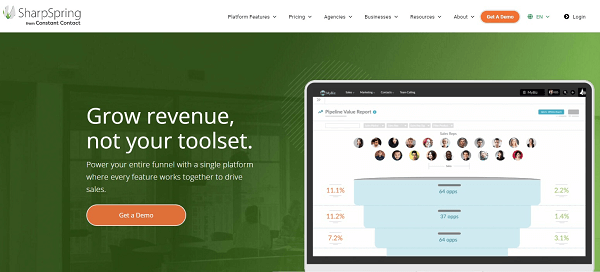
Why I Like It
SharpSpring shines with its top-notch marketing tools paired seamlessly with a powerful CRM system. This mix is perfect for businesses that want to catch leads and turn them into customers smoothly and effectively.
Most Important Marketing Automation Features
- Behavioral-Based Email Tracking: This lets you see exactly how leads interact with your emails, giving you the insights needed to fine-tune your messages.
- Dynamic Form Builder: Easy drag-and-drop setup helps you create forms that fill themselves out for returning visitors, boosting your conversion rates.
- Visual Workflow Builder: This tool allows you to visually organize and tailor your marketing steps, including complex decision-making processes that respond to customer actions.
- Advanced Lead Scoring: SharpSpring lets you assign scores to leads based on their actions, like visiting pages or filling out forms, making it easier to focus on the most promising contacts.
Pros
- SharpSpring’s integration of CRM and marketing tools means data flows smoothly, improving campaign and sales performance.
- The platform is user-friendly, with visual tools for crafting emails and workflows that simplify complex tasks.
- It excels at providing personalized content based on user behavior, boosting campaign success.
Cons
- The mobile app lacks key features, which may limit management while away from the desk.
- The features and customization options may overwhelm new users.
- The cost may be too high for smaller teams or growing businesses.

Why I Like It
ActiveCampaign stands out for its user-friendly design that makes marketing tasks simple. It helps businesses streamline their marketing by automating tasks so they can run campaigns and handle customer interactions smoothly without getting lost in the details.
Most Important Marketing Automation Features
- Advanced Email Marketing: ActiveCampaign shines in crafting emails that adjust to each recipient, boosting interaction and sales.
- Comprehensive Lead Scoring: It tracks how prospects interact and ranks them by how likely they are to become customers.
- Deep Data Integration: It connects with over 900 apps, keeping customer information together and useful.
- Multi-channel Messaging: It works across email, SMS, and social media, ensuring messages are consistent everywhere.
Pros
- Manages everything from automated emails to sales follow-ups effectively.
- Easy to use, regardless of your tech skills.
- Offers detailed reports to improve marketing tactics.
Cons
- Its many features can be daunting for newcomers.
- Costs can climb as you add features and contacts.
- While integration is strong, setting it up properly can be tech-heavy.

Why I Like It
Mailchimp turns the complexity of marketing into a breeze with its easy-to-use interface—ideal for the not-so-tech-savvy. It feels empowering, thanks to its straightforward design and strong support.
Mailchimp is revolutionary for small to medium-sized businesses, making the tangled web of marketing automation simple and effective. Here’s a closer look at its standout features and why it’s a leading choice.
Most Important Marketing Automation Features
- Audience Segmentation: Mailchimp helps you organize your audience details perfectly, making sure your messages hit the right target at the right moment.
- Behavioral Targeting: Craft campaigns tailored to user actions to keep your messages spot-on.
- Automated Journeys: Set triggers based on customer activities to run your marketing from start to finish automatically, from welcome emails to win-back campaigns.
- Performance Analytics: Monitor how well your campaigns are doing and fine-tune your tactics with detailed reports for improved results.
Pros
- Integrates smoothly with many other tools, increasing its effectiveness.
- Simplifies crafting intricate campaigns.
- Offers competitive prices, great for smaller companies.
Cons
- Although there are many templates, they cannot be used for tailor-made designs.
- Sometimes, importing data can be tricky, especially with detailed datasets.
- Some advanced features are only available in the pricier plans.

Why I Like It
I value Keap for its complete solution to growing small businesses. It combines CRM and marketing automation smoothly, simplifying how you handle customer interactions and automating marketing tasks. This combination is crucial for maintaining strong customer relationships efficiently without constant hands-on effort.
Most Important Marketing Automation Features
- Advanced Email Marketing: Keap’s email tools are powerful. You can send mass emails, automate your email campaigns, and send personalized emails easily, streamlining your email management.
- Lead Capture and Management: Keap provides custom landing pages and forms to help you gather and organize leads effectively. These leads can be automatically sorted for personalized follow-up.
- Sales Automation: Keap automates repetitive sales tasks like quotes, invoicing, and payments. This saves time and keeps your sales process consistent.
- Text Marketing: Adding text messaging to your automation can increase engagement. Keap’s text features work well with other tools to create a full marketing strategy.
- Lifecycle Automation: Keap’s tools help you manage customer interactions from start to finish, ensuring you don’t miss any opportunities.
Pros
- Integrates easily with many apps and services, improving functionality and workflow.
- Makes managing marketing campaigns and customer relationships simpler.
- Offers deep and customizable automation options from emails to sales.
- Provides a lot of learning resources and customer support.
Cons
- Can be expensive, especially for smaller businesses starting to grow.
- Has a steep learning curve for new users due to its many features.
- More advanced customizations are only available in more expensive plans.
- Some users may need deeper integration with specific tools.

Why I Like It
Zoho CRM is a complete solution that boosts marketing automation. It connects smoothly with over 800 apps, turning it into a powerful tool for crafting personalized customer journeys. This adaptability allows me to customize it to suit the specific needs of my projects effortlessly.
Most Important Marketing Automation Features
- AI-powered Insights: Zia, the AI assistant, provides helpful predictions and advice, simplifying how I handle customer interactions and sales tactics.
- Advanced Segmentation: This lets me sharpen my audience targeting using various criteria, making my marketing efforts more precise and effective.
- Multi-channel Marketing: Zoho CRM handles campaigns across all channels, from email to social media, ensuring consistent customer engagement.
- Customizable Dashboards and Reports: I can track real-time analytics, which is essential for making quick, informed marketing choices.
- Automated Workflows: These cut down on time spent on routine tasks, freeing me up to concentrate on more important strategies.
Pros
- Integrates seamlessly with numerous apps, increasing its functionality and versatility.
- Remains user-friendly despite its broad capabilities.
- Provides a fair pricing structure that includes key features without extra charges.
- Easily customizable to meet the unique requirements of my business.
Cons
- Initially, its wide array of features can be daunting.
- Setting it up to meet specific needs takes a lot of time at first.
- Sometimes, having too many options can make things more complicated.
- Response times can vary, although they are generally helpful.

Why I Like It
Pipedrive stands out for its focus on user-friendly design that simplifies sales tasks. It helps sales teams not just to stay busy but to achieve real results. This tool pushes teams to act, guides them through their sales journey, and ensures that every deal gets the attention it needs.
Most Important Marketing Automation Features
- Customizable Sales Pipelines: Adapt your sales flow to match your process, providing clear guidance and helping close deals faster.
- Email Integration and Tracking: Connect emails directly to deals and contacts, allowing you to view all client interactions in one spot, which is incredibly useful.
- Activity Reminders: Pipedrive ensures you remember to follow up, which is crucial for sealing deals.
- Lead Scoring: You can rank your leads based on how likely they are to convert. This focuses your efforts where they are most valued.
- Automated Workflow Triggers: Create automation for repetitive tasks, like sending follow-ups when a deal progresses.
Pros
- Easy for beginners to use.
- Highly customizable to fit our specific needs.
- Integrates smoothly with many other apps and services, boosting its functionality.
- Offers valuable insights for refining strategies and predicting sales.
Cons
- Depends on other apps for some key features.
- The mobile app is handy but lacks some features of the desktop version.
- New users may need time to leverage all its features.

Why I Like It
monday.com is unique for its exceptional ability to be customized. You can shape it to suit your sales strategies and business requirements. This flexibility is key in marketing, where a standard approach often falls short. Its easy-to-use interface also makes it friendly for those new to CRM systems.
Most Important Marketing Automation Features
- Lead Scoring: This tool changes the game by ranking leads based on specific criteria, helping to prioritize the most promising ones.
- Automated Workflows: Set up automatic actions using simple if-then rules to minimize errors and save time for more important tasks.
- Custom Dashboards: Build dashboards customized to various team needs or sales phases, showing key data and metrics clearly.
- Email Integration and Automation: Easily connects with email services like Gmail and Outlook, allowing you to handle emails right from the CRM.
- Digital Asset Management: Manages and shares marketing content efficiently, ensuring all teams have the latest resources.
Pros
- Highly customizable, especially in dashboards and automation.
- Intuitive drag-and-drop interface eases complex tasks.
- Strong ability to integrate with other tools, boosting functionality.
Cons
- The wide range of features can overwhelm newcomers.
- Some users report slow responses from customer support.
- Fewer integrations than some rivals.

Why I Like It
Salesforce Marketing Cloud draws me in with its powerful ability to link up with a range of tools that boost how businesses handle customer relationships and marketing across different platforms.
This CRM does more than just oversee customer interactions; it builds an environment that helps grow customer relationships through specific, personalized communications across various channels.
Most Important Marketing Automation Features
- Multi-channel Communication: Enables smooth marketing across email, social media, mobile, and web, ensuring consistent and tailored customer experiences.
- Advanced Personalization Tools: Uses AI to create customized content for each customer, boosting engagement and sales.
- Journey Builder: Helps marketers design and control customer paths, automating tailored content at every step.
- Analytics and Insights: Strong analytics tools monitor campaign results and customer actions, offering insights that help shape strategic choices.
Pros
- Integrates seamlessly with Salesforce’s broad system.
- Uses advanced AI to customize marketing to each customer’s preferences.
- Covers various communication platforms.
Cons
- The complex features can be too much for new users.
- Top-tier features are expensive, making it hard for small businesses or those on tight budgets to afford.
- Connecting with other apps might need extra setup.

Why I Like It
I really value Drift for how it changes up marketing with its chat-first approach, which really fits today’s need for quick and personal communication. It’s more than just automated replies; it builds real conversations that feel genuine and instant.
Drift is a top choice in CRM tools for marketing automation because of its standout real-time chats and smart chatbot features.
Most Important Marketing Automation Features
- AI-Powered Chatbots: These bots chat so naturally that visitors feel like they’re talking to a human, keeping them engaged even without a live person available.
- Conversational Landing Pages (CLPs): These pages start chats right away, boosting how visitors engage and how often they convert.
- Drift Engage: Uses AI to analyze how visitors behave and triggers custom actions, making sure interactions are always relevant.
Bionic Chatbots: These advanced bots adjust their responses based on how the visitor behaves, creating a more personalized experience.
Pros
- Really good at personalizing interactions with its powerful chatbots.
- Features like CLPs and advanced chatbots are beyond typical CRM tools, placing Drift at the forefront of innovative marketing.
- Tools for real-time interaction make sure you grab and nurture leads effectively.
Cons
- Its complex features can be tricky to learn if you’re not used to sophisticated automation and AI.
- The top-tier features can be expensive.
- Setting up complex chatbot functions can take a lot of time.
Considerations for Small vs. Large Businesses
When I consider the needs of small versus large businesses when selecting a CRM for marketing automation tools, it’s clear that both have unique requirements, but the scale and complexity of their operations differ significantly.
For Small Businesses
Small businesses need CRMs that are affordable and scalable. They benefit from cloud-based solutions that avoid large initial IT costs.
A simple, easy-to-use interface with essential CRM features like contact management and email marketing usually meets their needs.
Integrating with other tools like accounting software or email platforms is crucial for smooth operations without much IT help.
For Large Businesses
On the other hand, large businesses need CRMs with many advanced features like detailed analytics, extensive customization, and strong data security.
These businesses often need to connect their CRM with various enterprise systems, including ERP systems and complex marketing platforms.
Managing and analyzing large data volumes across different departments and channels is crucial for maintaining efficiency and gaining valuable insights.
Conclusion
In 2024, picking the right CRM for marketing isn’t just about tech; it’s strategic, impacting customer engagement and business growth. The CRM landscape is diverse and complex. A good choice aligns with your marketing plans, boosts efficiency, and ups ROI. A great CRM manages data well, amps up personalized interactions, and runs effective campaigns.
FAQ
Let me answer some common questions about CRM for marketing automation:
What type of CRM is used for marketing automation?
CRM systems for marketing automation come in three main types: operational, analytical, and collaborative. Operational CRMs automate marketing tasks, handle customer interactions, and simplify sales activities. Analytical CRMs analyze customer data to boost marketing strategies, while collaborative CRMs unite different business areas to improve departmental communication.
Which is the best marketing automation tool?
The top marketing automation tools depend on what your business needs. HubSpot is great for inbound marketing, Salesforce Marketing Cloud offers lots of customization and analytics, Keap has strong automation and customization, and ActiveCampaign is excellent for email marketing.
What is the best CRM for a marketing agency?
For marketing agencies, HubSpot is often the top choice because it offers an all-in-one marketing suite covering social media, email, and SEO. Salesforce Marketing Cloud is another good option, especially for larger agencies that require strong analytics and integrations.
What is the role of CRM in marketing automation?
CRM software with marketing automation simplifies customer relationship management by automating tasks, organizing audiences, and sending personalized marketing campaigns. It guides leads through the sales process, aiming to turn them into loyal customers.











